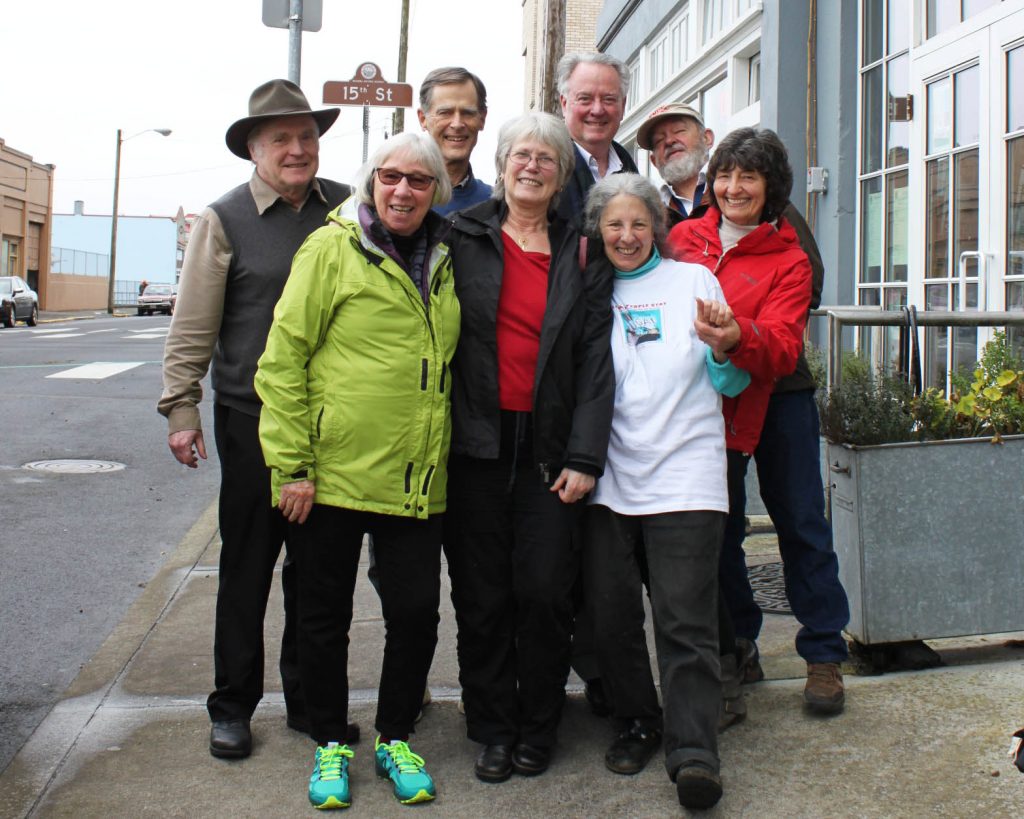
The concept which grew into our present Co-op came from the Rainbow Family Gathering in 1972. A small group of people in Astoria formed a buying club, and collectively purchased foods in bulk. Our founders raised money by having rummage sales, provided free labor, and opened the Co-op’s first storefront in 1974. It was a small 650 square foot space near the Columbian Cafe. It was called the “Community Store” and its slogan was “food for people, not for profit.”
Back then there were few grocery shopping choices in our coastal region. It was the beginning of a movement toward bulk foods to keep away from packaging. There was less emphasis on organic; the focus was on simple, whole foods. There were bulk grains and beans, spices, cheese (cut by volunteers), raw milk in glass bottles, tofu and miso.
“We had a holistic approach to life and the Co-op was in large part what enabled us to live that lifestyle in Astoria,” said Carol Folk, one of the Co-op’s first board members.
Folk remembers weekly board meetings at people’s houses with “endless discussions” about the details of the bylaws. Forming the Co-op was a painstaking process, and there were many clashes throughout its history, but it was worth it, as its value reigned even greater than the unique food offerings; it was how locals in a rural community connected.
“The food brought us together but it was a platform for sharing a common view about life and politics, our culture and our world views,” Folk said.
At first there were no distributors. Volunteers drove to Portland to pick up supplies. Everything was done by volunteers; even the store’s first manager didn’t receive a paycheck. Josie Peper was the first elected non-paid manager. She coordinated the volunteer workforce.
“The idea of hiring somebody to do carpentry or plumbing: no, we put it out there to the members to find out who could do it,” Peper said.
She held benefits to offset the store’s operating expenses including monthly square dances and potluck dinners with live music at the Netel Grange. Peper eventually took a hiatus from the Co-op to continue her education and others stepped in to run the store.
Some consequences of the Co-op relying only on volunteers started showing. The store was closed often and the shelves were randomly stocked. Throughout its history, the Co-op experimented with several management structures. The store began to function well again when the board hired its first paid manager, Stewart Bell, who earned 75-cents an hour in food credit. Bell recalls that the cost of living then was less, which made this possible.
The Co-op moved to a daily manager structure in which there was a different person each day overseeing the store. Carol Newman was one of them. She says she did it out of goodwill because she wanted to see the Co-op happen.
“Everyone got 75-cents an hour of food credit and we were so democratic until somebody brought up, some of the people shopping in the store were earning 100 bucks an hour; lawyers, doctors, teachers, business people, whatever. There was talk of exploiting ourselves,” Newman said.
Richard Hurley, a former Co-op manager helped form Community Workers Incorporated, a worker’s collective which contracted with the Co-op to operate the store and for the first time, workers started getting paid above minimum wage.
“We definitely felt we were part of a larger movement. We were lighting little candles that would get brighter and spread toward a whole different way of the economy being run. I was enamored with the economic structure hence the worker’s collective because there was always controversy over exploitation of workers,” Hurley said.
The Co-op officially became a consumer-owned cooperative, filing with the state of Oregon in 2004. Before that it was technically a non-profit, but everyone referred to it as a co-op.
When asked what their hopes are for the Co-op as it matures, some founders offer critique including the store carries too much packaged food, and it’s lost the participatory vibe that the Community Store once had. But Bell points out how the changes have been good, and there seems to be agreement among the founders.
“There is a high priority that the workers are paid well. What we got paid was a joke… having a store which can employ people and pay them a decent wage is a wonderful thing,” Bell said.
Nowadays our co-op uses a livable wage model. Starting pay is $11.50 per hour* and the average wage is nearly $17 per hour plus benefits. With competitors now offering organic food, this would not be possible without a concerted effort to grow sales by broadening our shopper base and evolving to meet the needs of today’s ownership.
The opportunities our Co-op has to provide good jobs, great food for the community, and a market for local farmers and producers is thanks to our founding mamas and papas for creating and nurturing the Co-op. This article only scratches the surface as there are so many people who contributed to the Co-op’s founding in both big and little ways throughout our 43-year history. It seems more important than ever to reexamine our roots and give credit where it’s due as we plan a future expansion.
Note: *That was the starting pay when this was written in 2017. The co-op has since increased the starting pay to match the current livable wage model.